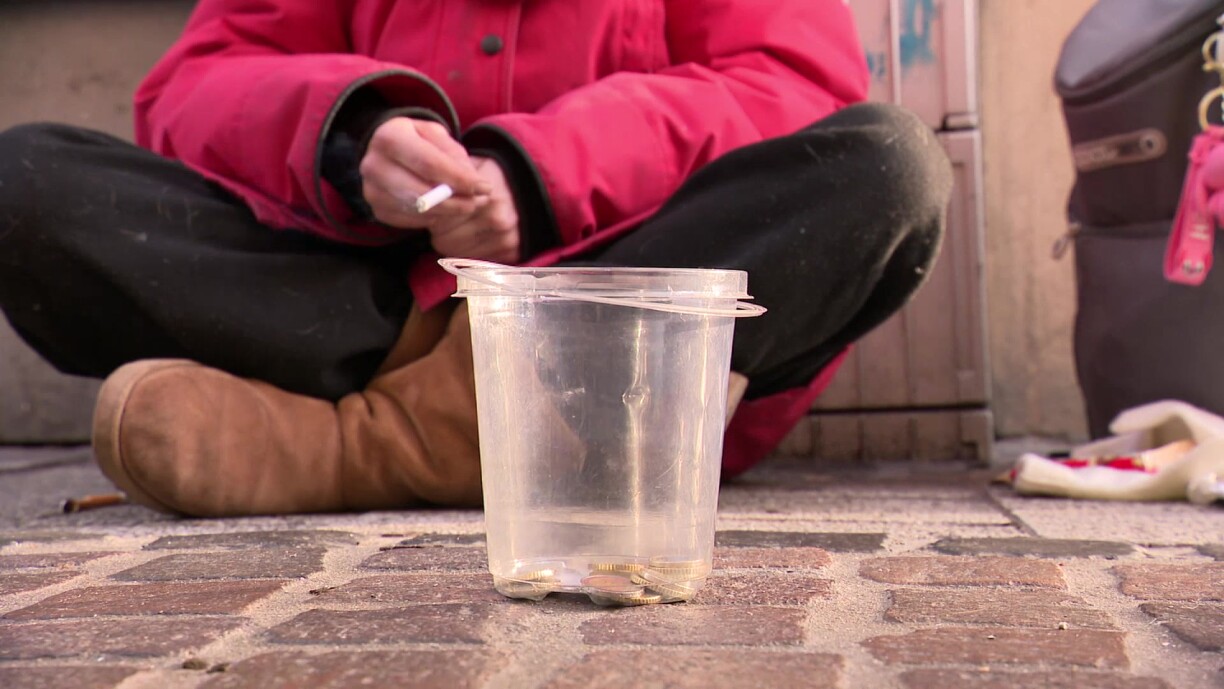
Michelle, a 23-year-old who has spent six years living on the streets, shared her experiences with our colleagues from RTL Télé on Place de Théâtre. While her friends were reluctant to allow filming in their space, Michelle still decided to share her perspective in front of the camera.
Since the beginning of the year, the homeless have noticed that the police have become significantly stricter. Michelle recounted, saying that she herself didn’t really notice it when she was begging, but her friends told her that they did have problems. “I notice it more in the places where we sleep at night, the police often come and tell us that we have to leave. That wasn’t the case before,” Michelle explained. “We get chased away everywhere and that’s how it comes across to us: The main thing is that we’re gone and then we’re no longer their problem,” she said.
Dennis is originally from southern Germany and came to Luxembourg a few months ago. He too has already been told that the little basket he uses to collect small change is actually forbidden. The discussion about the begging ban sounds pretty familiar to him. He was in Basel three years ago when a begging ban was introduced there. Whether in Switzerland or Luxembourg, Dennis cannot understand these measures: “We are not part of organised begging. I’ve been living on the streets for so many years and I just want to make a living and not commit criminal offences by stealing. That’s why I prefer to sit on the street and beg for my money. You get penalised for something you don’t do, because I don’t go up to someone and say ‘Give me money now, give me money’. I just sit around and if someone gives me something it’s good, if not it’s okay too.”
A pervasive sense of uncertainty is palpable among the homeless community, stemming from both the perceived unwelcome atmosphere in Ville-Haute and the absence of alternative solutions and clear guidelines.
Michelle expressed the need for clarity, stating that there should be clear guidelines on what they are still allowed to do and what not, and where they can find alternatives. “It’s easy to have a solution for one side of the problem, but then you also need a solution for the other. Because otherwise you have the same problem in a different place,” Michelle stressed.
At first glance, it may seem that there are ample alternatives and support measures available for the homeless population. However, Michelle explains to our colleagues that she is too young for some measures and her boyfriend is too old for others. As a result, they prefer to endure life on the street as a couple – around the clock.
Even spending the night at the “Wanteraktioun” is not an option for Michelle and her friends. She explains, “Some [of the people there] are a bit cleaner, others are really quite disgusting. You don’t really want to interact with everyone there. Then there are also those who are heavily addicted to drugs and they don’t pay attention to anything anymore. That’s really not pleasant at all anymore for some and these people are often in the majority in places like that. And I, for example, stay far away from things like that.”
The presence of beggars on Grand Rue – practically on his doorstep – does not really bother Carlo Keller, a shop owner in Luxembourg City. To a certain extent, he even accepts that the corridor in front of his shop has become a popular sleeping spot.
However, Keller has harboured a longstanding concern: the aftermath left behind by those who spend the night. He recounts instances of individuals urinating on windows and smearing his shop windows, creating a need for extensive cleaning. Keller is frustrated by the situation, sharing photos with our colleagues of people sleeping in the corridor and the resultant mess left behind. He discloses that he and his staff have even experienced aggression when addressing the issue. He recounts a recent case, stating, “On Saturday morning, our two shop assistants came, and it took them 40 minutes to clean the whole corridor, and I don’t think that’s right.”
Keller closely followed the discussion surrounding the begging ban but believes it fails to address the actual problem: “It’s not a bad thing that the begging ban has been implemented, but it doesn’t change our situation at all.” He reiterates that he “doesn’t have any problems” with people begging during the daytime. The real issue for Keller lies in the evenings after 7 or 8pm when “the mess starts,” calling for targeted solutions during these hours.
Interviews with Michelle and Dennis (in Luxembourgish and German)
Interview with Carlo Keller (in Luxembourgish)
Kloertext: Heeschen: Belästegung oder Mënscherecht? (11.1.24)